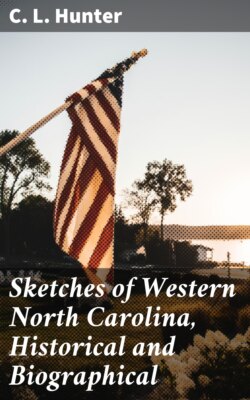Читать книгу Sketches of Western North Carolina, Historical and Biographical - C. L. Hunter - Страница 27
На сайте Литреса книга снята с продажи.
ORIGIN OF THE ALEXANDER FAMILIES OF MECKLENBURG COUNTY.
ОглавлениеThe name, Alexander, is of frequent mention among the nobility of Scotland. About the year 1735 John Alexander married Margaret Gleason, a "bonnie lassie" of Glasgow, and shortly afterward emigrated to the town of Armagh, in Ireland. About 1740, wishing to improve more rapidly his worldly condition, he emigrated with his rising family, two nephews, James and Hugh Alexander, and their sister, who was married to a Mr. Polk, to America, and settled in Nottingham, Chester county, Pa. These two nephews, and their brother-in-law, Polk, soon afterward emigrated to Mecklenburg county, North Carolina, then holding forth flattering inducements for settlement. These families, of Scotch-Irish descent, there prospered in their several callings, and early imbibed those principles of civil and religious liberty which stamped their impress on themselves and their descendants, and shone forth conspicuously preceding and during the American Revolution.
About the time of this emigration of the Alexanders to North Carolina, John Alexander moved to Carlisle, Cumberland county, Pa. While he resided there his son James (James the first) married "Rosa Reed," of that place. Soon after his marriage he left Carlisle, and settled on "Spring Run," having purchased a tract of land which covered "Logan's Springs," where the celebrated Mingo chief, Logan, then lived. After Logan's death he moved to the Springs, which valuable property is still owned by the Alexander heirs.
John Alexander, partaking of the roving spirit of the age, left Carlisle, and finally settled in Berkeley county, Va., where he purchased a large farm, and spent the remainder of his days. His son James had twelve children, seven sons and five daughters. One of his daughters, Rachel, married Joseph Vance, of Virginia, the ancestor of ex-Governor Vance, of Ohio, and other descendants. He gave Vance a farm of three hundred acres as an inducement to settle near him. Vance accepted the gift, and soon afterward removed to the farm; but Indian troubles breaking out at that time, he sold his possession and returned to Virginia, selecting a location near Martinsburg.
James Alexander (James the second) had four sons and six daughters. The eldest son (James the third) married his cousin Celia, youngest daughter of Robert Alexander, of whom was a descendant, Robert Alexander (perhaps a son), a captain in the Revolution, who married Mary Jack, third daughter of Patrick Jack, of Charlotte, and settled in Lincoln county, where he died in 1813.
James Porterfield Alexander (James the fourth), and son of James the
third, married Annie Augusta Halsey, grand-daughter of the Hon.
Jeremiah Morton, and resides, in this centennial year, on the St.
Cloud plantation, Rapidan Station, Culpeper county, Va.
Hugh Alexander, son of James the first, married Martha Edmundson,
settled in Sherman's Valley, Pa., and had a large family. He died at
Independence Hall, Philadelphia, while sitting as a member to form a
State Constitution.
Another prolific source of the Alexanders in America is traceable to the descendants of seven brothers, who fled from Scotland, on account of political troubles, to the north of Ireland, and passing through the Emerald Isle, sailed for America, and landed in New York in 1716. One of their descendants was William Alexander, born in New York in 1720, a son of James Alexander, of Scotland. He became a distinguished officer in the Revolutionary war, known as "Lord Stirling." He married a daughter of Philip Livingston (the second lord of the manor), a sister of Governor Livingston, of New Jersey.
From these prolific sources (Scotch and Scotch-Irish) North Carolina, and other States of the American Union, have received their original supplies of Alexanders, embracing, in their expansion, many distinguished names.
In the list of the signers of the Mecklenburg Declaration of the 20th of May, 1775, six bear the name of Alexander, and a host of others, officers and privates, honored the name in their heroic achievements during the Revolutionary war. Two of the distinguished teachers in Rowan county, preceding the Revolution, were James Alexander and Robert Brevard.
It is also worthy of mention that one of the twenty-six persons who met in Charleston, in the fall of 1766, after the repeal of the Stamp Act, under the leadership of that early patriot, General Christopher Gadsden, rejoiced under the duplicated name of Alexander Alexander. He had strayed off from the paternal roof in North Carolina, and was employed there in the honorable calling of schoolmaster. Johnson, in his "Traditions and Reminiscences," thus speaks favorably of his eminent worth:
"Alexander Alexander was a school-master of high character and popularity. He was a native of Mecklenburg, North Carolina, and educated in the Whig principles of that distinguished district."
